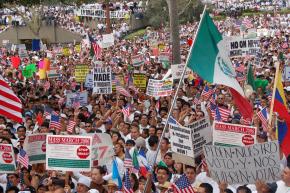Why we march on May Day
looks ahead to the demonstrations planned this year for May Day.
INTERNATIONAL WORKERS DAY on May 1 marks the anniversary of the 1886 strike when thousands of workers across America walked off the job to demand the eight-hour workday.
Today, 125 years later, we seek to march again for the rights of workers all over the world. This call is addressed to the working people in the U.S. who seek better living conditions in this twisted society.
In Chicago in 1886, the Haymarket Martyrs--leaders of the workers' movement who were convicted of trumped-up charges and put to death--were heroes of the fight for the eight-hour day. These martyrs are ours--they died for the right of workers to fight back against criminal conditions in the workplace and the repressive police who served only the wealthy. This rich history of working-class struggle has been pushed to the edges of U.S. history textbooks.
In 2006, the meaning of May Day was reborn as millions marched across the U.S. for the legalization of undocumented immigrant workers. This movement, at the height of Bush-era racism, defeated the anti-immigrant bill HR 4437, a proposal that would have criminalized all 12 million undocumented immigrants in the U.S. and anyone who aided them.

The May Day mega marches put legalization for immigrants in the forefront of national politics. At the time, it seemed as if this movement would catalyze a new period of protest and action for workers' rights in the U.S. However, when one considers the realities of the situation today and what has happened in the last 5 years, questions begin to emerge about why we should march this upcoming May Day.
As President Barack Obama reaches a compromise with House Speaker John Boehner on cutting the budget deficit, a line has been drawn in the sand between wolves and sheep, with both Obama and Boehner siding with the wolves. The sheep are then herded to accept the renewed attack on immigrant communities and the overall decline in the living standards of working families.
The betrayal doesn't end with the federal or state governments--it extends to the liberal organizations that, instead of fighting for their constituents, are intent on lobbying. Liberal responses to the scale of the economic crisis--such as the "One Nation" rally in Washington this past October--have fallen short of relevance.
So understandably, there are many who wonder why we should march.
The revolutionary movements of the Middle East and the occupation of the Wisconsin state Capitol by workers and students should be two big reasons why we march. The Egyptian revolution should be a shining example of how ordinary people have the power to collectively change society. In the U.S., the defense of public-sector workers' bargaining rights in Wisconsin not only resonates with public employees across the country, but with all workers who feel the weight of the criminal inequality in our society. Workers in this country have to look to these struggles as examples--and as fights that are theirs, too.
We have to march together because we need solidarity. We march because a labor movement that looks the other way when 12 million undocumented workers are being criminalized is not a labor movement at all. We march because young workers need an alternative to a future ridden with poverty and environmental devastation.
We cannot afford to stay at home and endure more of the sacrifices that the wealthy refuse to share. All workers need to march because only in a mass gathering of struggling workers will we find the allies, organizations and politics that will defend us from austerity, deportations, evictions, incarceration and environmental destruction.
An injury to one is an injury to all--see you on May 1.


